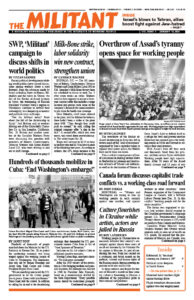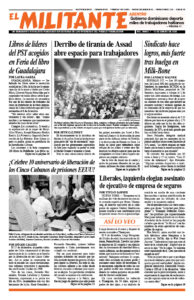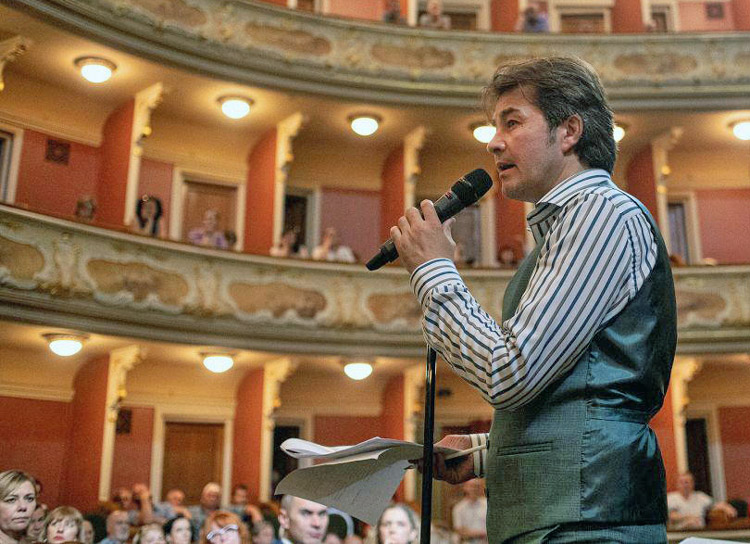Working people in Ukraine have tenaciously defended their country’s sovereignty against almost three years of an all-out invasion by the Vladimir Putin regime in Moscow. As part of conducting this war, Putin has carried out a systematic and brutal assault on the political, cultural and human rights of the Russian people, fearing growing opposition to his war and his rule.
In sharp contrast, and despite the horrors of Moscow’s assault on their country, culture is flourishing in Ukraine, a reflection of the population’s pride in their national independence.
The Ivan Franko National Academic Drama Theater in central Kyiv has been packed almost every day since it reopened six months after Russian tanks rolled across the border toward the capital on Feb. 24, 2022. It was founded in 1920 amid a flowering of Ukrainian culture that was encouraged by the revolutionary workers government led by V.I. Lenin after the Russian Revolution.
Ivan Franko (1856-1916) was an outstanding Ukrainian cultural figure who penned poems, novels and plays. He wrote about peasant and working-class revolutionary struggles, and the condition of women and Jews, in his native Galicia, now western Ukraine. He translated Homer, Dante, Shakespeare, Goethe, Emile Zola, Aleksandr Pushkin, Henrik Ibsen and many others.
Theater director Yevhen Nyshchuk, along with many of his colleagues, volunteered for the Ukrainian army as Putin’s forces crossed the border. Tickets are free for members of Ukraine’s armed forces and substantial funds are raised for the military.
More than 1,500 performances of over 50 international and Ukrainian classics, as well as contemporary drama, have been attended by over half a million people.
One play is adapted from the classic anti-war novel by German writer Erich Maria Remarque, All Quiet on the Western Front, which depicts the horrors of trench warfare in World War I. In the novel, the main German character sees Russian prisoners of war and French soldiers, realizing they are just like him and his comrades.
The three actors in the main roles of the adapted play, “Three Comrades,” are performing after having enlisted and fought at the front for a year. They say this gives realism to their performances. To take part in the play today, their commander grants them leaves.
“Remarque sounded completely different. The reality of the war, which has already affected everyone, has changed us,” Nyshchuk, also an actor, told CNN. He often addresses audiences to thank them for their commitment. “I felt the audience had changed its perception of the theater, had more appetite for it, for this exchange of energy.”
People are not so much escaping the realities of war, but seeking thought-provoking entertainment. Air raid sirens regularly interrupt performances, forcing people to shelter in nearby underground metro stations.
On Dec. 25, “everyone survived a missile attack” of more than 70 missiles and over 100 drones, “and in the evening they came to the performance, which was not canceled,” Nyshchuk said. Long audience applause celebrates the performances, but also each other for their spirit of survival.
Explosion of bookstores, books
The number of bookstores across the country has jumped from 200 prewar to almost 500 now. The largest, Sens, opened on Kyiv’s main street in the midst of the war. The shop rapidly became a popular volunteer hub. Last year it offered over 57,000 titles to over half a million customers. Crowds attend the store’s busy schedule of book launches and other programs.
“A book is the most convenient way to spend time during the war when it is impossible to predict anything,” Sens’ founder, Oleksiy Erinchak, told CNN. “Many people have switched to the Ukrainian language [from Russian]. They are trying to understand what it means to be Ukrainian. And books make it much easier to do that.”
The number of adults reading books every day has doubled during the war to 16%, the Ukrainian Book Institute reports.
A popular Ukrainian band, Okean Elzy, plays “at big concerts and in shelters, in stadiums and in dugouts,” band members say. “But it’s not the place that matters, it’s our togetherness.” Since Putin’s invasion, they have performed over 300 concerts for the military, including near the front lines.
Yegor Firsov, a chief sergeant who enlisted in 2022, told CNN he supports an active cultural life, even if the front lines for soldiers are a “real hell.” Whenever he gets a leave, he goes to concerts and other cultural events, noting, “bookshops and theaters are about the real thing, about life.”
Putin strangles Russian culture
In stark contrast, the Putin regime has accelerated its attack on culture in Russia in order to suppress any opposition to the war. After his repressive forces quashed sizable political protests following Moscow’s invasion of Ukraine, the Kremlin intensified a far-reaching crackdown on poets, playwrights, artists, musicians and other cultural workers. Many have been arrested, prosecuted and silenced, or have fled the country.
For the past year, the Russian Culture Ministry has been demanding all state-funded theaters reflect “traditional values” as defined by Putin. His “values” include strict adherence to “service to the Motherland” and “unity of the nations of Russia,” which includes Ukraine.
The Kremlin is seeking to “identify and destroy everything that is alive on the Russian stage,” theater critic Marina Davydova told the Moscow Times.
One theater worker noted that Russian classics like plays by Nikolai Gogol aren’t immune from censorship. “If someone complains that some version of ‘The Wedding’ doesn’t reflect ‘family values,’” then there won’t be state funding for it.
Nadya Raplya, a dissident artist now in exile in Berlin, told the Moscow Times her exhibition in 2019, called “Autumn of the Pakhan,” Russian slang for a crime boss, was raided and shut down by police.
This was before the war when many Russian artists claimed to be staying out of politics. She rejected this, saying, “There is no such thing — art cannot be apolitical.”
Like thousands of other cultural workers, Raplya says she looks forward to the war being over, the Putin regime gone and all political prisoners released. “Then I will probably be in Moscow tomorrow.”


